| Listing 1 - 10 of 61 | << page >> |
Sort by
|
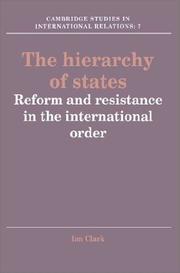
ISBN: 0521378613 0521372526 0511521685 Year: 1989 Volume: 7 Publisher: Cambridge Cambridge University Press
Abstract | Keywords | Export | Availability | Bookmark
 Loading...
Loading...Choose an application
- Reference Manager
- EndNote
- RefWorks (Direct export to RefWorks)
The hierarchy of states presents Ian Clark's Reform and resistance in the international order, a well-established text on international relations first published in 1980, in a completely revised form. Combining a detailed examination of theory with a full account of historical developments, Dr Clark analyses the nature of international order - the hierarchical state system - and its potential for reform. The theory of international order is explored tracing two traditions of thought epitomised in the writings of Kant and Rousseau, whilst in a historical survey Dr Clark covers the main attempts to implement international order since 1815 and includes such aspects as concert diplomacy, alliance systems, international organisations as well as such informal understandings as nuclear deterrence, crisis management and spheres of influence. This revised edition contains two new chapters - one on international/world order issues and the other on 'macro' changes between 1815 and 1990. Dr Clark has updated his discussion on the course of superpower relations and most of the material on the post-1945 period is introduced in this edition for the first time.
International relations. Foreign policy --- International law --- World history --- anno 1800-1999 --- International relations. --- World politics --- Relations internationales --- Politique mondiale --- Social Sciences --- Political Science --- Coexistence --- Foreign affairs --- Foreign policy --- Foreign relations --- Global governance --- Interdependence of nations --- International affairs --- Peaceful coexistence --- World order --- National security --- Sovereignty
Book
ISBN: 0198782098 Year: 1999 Publisher: Oxford Oxford University Press
Abstract | Keywords | Export | Availability | Bookmark
 Loading...
Loading...Choose an application
- Reference Manager
- EndNote
- RefWorks (Direct export to RefWorks)
Coexistence --- Colonialism --- Coëxistence pacifique --- Foreign affairs --- Foreign policy --- Histoire politique --- Interdependence of nations --- International politics --- International relations --- Internationale betrekkingen --- Internationale politiek --- Ordre mondial --- Peaceful coexistence --- Political history --- Politics [International ] --- Politics [World ] --- Politiek [Internationale ] --- Politieke geschiedenis --- Politique internationale --- Relations internationales --- Vreedzame coëxistentie --- Wereldorde --- World order --- World politics
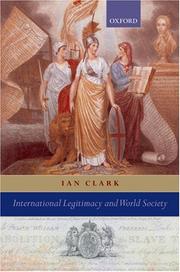
ISBN: 9780199297009 0199297002 Year: 2007 Publisher: Oxford Oxford University Press
Abstract | Keywords | Export | Availability | Bookmark
 Loading...
Loading...Choose an application
- Reference Manager
- EndNote
- RefWorks (Direct export to RefWorks)
The conventional view of international society is that it is interested only in co-existence and order amongst states. This creates a puzzle. When the historical record is examined, we discover that international society has repeatedly signed up to normative principles that go well beyond this purpose. When it has done so, it has built new normative constraints into international legitimacy, and this is most conspicuously so when it has espoused broadly humanitarian principles. This suggests that the norms adopted by international society might be encouraged from the distinct constituency of world society. The book traces a series of historical case studies which issued in international affirmation of such principles: slave-trade abolition in 1815; the public conscience in 1899; social justice (but not racial equality) in 1919; human rights in 1945; and democracy as the only acceptable form of state in 1990. In each case, evidence is presented of world-society actors (transnational movements, advocacy networks, and INGOs) making the political running in support of a new principle, often in alliance with a leading state. At the same time, world society has mounted a normative case, and this can be seen as a degree of normative integration between international and world society. Each of the cases tells a fascinating story in its own right. Collectively, they contribute to the growing IR literature on the role of norms, and especially that written from a broadly English School or constructivist perspective. The book thereby puts some real historical flesh on the concept of world society, while forcing us to reconsider traditional views about the 'essential' nature of international society.
International cooperation --- International obligations --- Social norms --- Legitimacy of governments. --- International relations. --- Coopération internationale --- Obligations internationales --- Normes sociales --- Légitimité des gouvernements --- Relations internationales --- History. --- Histoire --- Coexistence --- Foreign affairs --- Foreign policy --- Foreign relations --- Global governance --- Interdependence of nations --- International affairs --- Peaceful coexistence --- World order --- National security --- Sovereignty --- World politics --- Governments, Legitimacy of --- Legitimacy (Constitutional law) --- Consensus (Social sciences) --- Revolutions --- State, The --- General will --- Political stability --- Regime change --- Folkways --- Norms, Social --- Rules, Social --- Social rules --- Manners and customs --- Social control --- International agreements --- International law --- Treaties --- Cooperation, International --- Institutions, International --- International institutions --- Cooperation --- International relations --- International organization --- Coopération internationale --- Légitimité des gouvernements
Book
ISBN: 0198277598 9780198277590 Year: 1990 Publisher: Oxford Clarendon Press
Abstract | Keywords | Export | Availability | Bookmark
 Loading...
Loading...Choose an application
- Reference Manager
- EndNote
- RefWorks (Direct export to RefWorks)
War --- War. --- Moral and ethical aspects. --- War - Moral and ethical aspects.
Book
ISBN: 0855204834 9780855204839 Year: 1982 Publisher: Oxford: Martin Robertson,
Abstract | Keywords | Export | Availability | Bookmark
 Loading...
Loading...Choose an application
- Reference Manager
- EndNote
- RefWorks (Direct export to RefWorks)
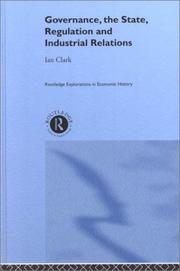
ISBN: 0415202639 0203457838 113463207X 1280317442 0203257154 9780203457832 9780415202633 9780203257159 9781134632022 9781134632060 9781134632077 1134632061 Year: 2000 Publisher: London New York Routledge
Abstract | Keywords | Export | Availability | Bookmark
 Loading...
Loading...Choose an application
- Reference Manager
- EndNote
- RefWorks (Direct export to RefWorks)
This book makes an important contribution to the history and theory of British post-war economics in its presentation of an innovative, historically informed, yet contemporary theory of the British state.
Industrial policy --- Industrial relations --- Corporate governance --- Reconstruction (1939-1951) --- Great Britain --- Economic policy --- Foreign economic relations --- Corporate governance. --- Industrial policy. --- Industrial policy - Great Britain. --- Industrial relations. --- Management --- Business & Economics --- Industrial Management --- Foreign economic relations. --- Faraday partnerships --- Industrial policy - Great Britain --- Industrial relations - Great Britain --- Corporate governance - Great Britain --- Reconstruction (1939-1951) - Great Britain --- Great Britain - Economic policy - 1979-1997 --- Great Britain - Economic policy - 1997 --- -Great Britain - Foreign economic relations
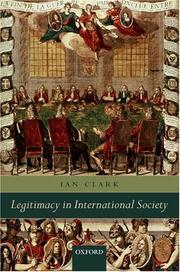
ISBN: 9780199219193 0199219192 Year: 2007 Publisher: Oxford Oxford University Press
Abstract | Keywords | Export | Availability | Bookmark
 Loading...
Loading...Choose an application
- Reference Manager
- EndNote
- RefWorks (Direct export to RefWorks)
Book
ISBN: 9780199556267 0199556261 Year: 2011 Publisher: Oxford Oxford University Press
Abstract | Keywords | Export | Availability | Bookmark
 Loading...
Loading...Choose an application
- Reference Manager
- EndNote
- RefWorks (Direct export to RefWorks)
Climatic changes --- Concert of Europe. --- Hegemony --- Hegemony. --- International organization. --- International relations. --- International cooperation.
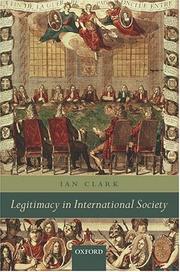
ISBN: 0199258422 Year: 2005 Publisher: Oxford Oxford University Press
Abstract | Keywords | Export | Availability | Bookmark
 Loading...
Loading...Choose an application
- Reference Manager
- EndNote
- RefWorks (Direct export to RefWorks)
International relations. --- Legitimacy of governments. --- Recognition (International law). --- Coexistence --- Coëxistence pacifique --- Erkenning (Internationaal recht) --- Foreign affairs --- Foreign policy --- Gouvernement légitime --- Gouvernement--Légitimité --- Interdependence of nations --- International relations --- Internationale betrekkingen --- Legitimacy of governments --- Legitimiteit van de regering --- Légitimité des gouvernements --- Ordre mondial --- Peaceful coexistence --- Recognition (International law) --- Reconnaissance (Droit international) --- Regeringen--Legitimiteit --- Regeringen--Wettigheid --- Relations internationales --- Vreedzame coëxistentie --- Wereldorde --- Wettige regering --- Wettigheid van de regering --- World order --- International relations. Foreign policy --- Légitimité des gouvernements

ISBN: 0198781660 9780198781660 Year: 1997 Publisher: Oxford Oxford University Press
Abstract | Keywords | Export | Availability | Bookmark
 Loading...
Loading...Choose an application
- Reference Manager
- EndNote
- RefWorks (Direct export to RefWorks)
#SBIB:327.1H10 --- Internationale betrekkingen: theorieën --- International relations. Foreign policy --- World politics --- International relations --- History --- 20th century --- #SBIB:AANKOOP
| Listing 1 - 10 of 61 | << page >> |
Sort by
|

 Search
Search Feedback
Feedback About UniCat
About UniCat  Help
Help News
News